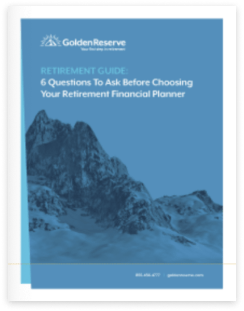Debunking the Retirement Myth: You Don’t Need 2 Million Dollars
Feeling that nagging doubt about your retirement savings? You’re not alone. A recent study found just 49%…
Golden Reserve

If a friend or family member were to ask what your investment style is, would you say “active,” “passive,” or “something passive aggressive”? If the latter, you’re probably in the majority. There’s a lot of talk in the financial planning industry about what role active and passive investing should play in your portfolio, and let’s be honest—it’s not exactly riveting. So, let’s cut to the chase. For some people, a mix of both could make sense. But for retirees, we think a passive investment style is the clear winner. Here are three reasons why:
1) Performance
In active investing, the goal is to beat the market. And as you know, rarely does anyone do that successfully. Active investing entails picking investments based on an assessment of their potential performance in the future. It involves a good deal of analysis and, of course, trading. You could do this as a retail investor, but many people leave it to the pros and invest in a fund where a portfolio manager does the legwork.
In passive investing, you’re not trying to beat the market, but match its performance. Passive investors typically buy and hold investments that match the makeup of popular indexes, such as the Dow Jones Industrial Average, S&P 500, or NASDAQ. The benefit is you’re riding an index whose performance is normally more predictable than that of an individual stock.
2) Cost
Besides, active investing can be expensive. The expense ratios tend to be more costly because you need to compensate the analysts and managers who set the fund’s strategy. According to a recent Forbes article the average expense ratio in 2019 for actively managed funds was .66%. The average for passively managed funds was just .13%.
While a fraction of a percent doesn’t sound like much, remember those are just averages. Some actively managed funds can have expense ratios that exceed 1–1.25%, the threshold at which the industry considers an expense ratio to be high. It’s important to put that into the context of how those expense ratios are paid. Since they’re netted off your returns, you won’t get a bill. But, as an example, if your return is 5% and the expense ratio is over 1%, that’s more than 20% of what you earned getting eaten up by fees.
3) Research
Finally, with passive investing there’s no in-depth research required for individual investment picks. You can skip the confusing meetings discussing the finer points of mutual funds, or the need to constantly review your financial advisor’s recommendations. That’s time consuming, and let’s face it, you didn’t retire to monitor your money all day long.
And speaking of time, with passive investing you’re not trying to time the market, which is an especially important point because trying to do so is risky business. The cost of a mistake is often too great for retirees who don’t have additional working years to try to recoup the loss.
All that to say, if you’re a passive investor, you’re doing just fine. Just don’t be passive aggressive with Cousin Bob. If he insists on debating the finer points of active vs. passive investing at the dinner table, tell him you know just the people to call and schedule him a no-cost, no-obligation consultation with us.

Share this article
Feeling that nagging doubt about your retirement savings? You’re not alone. A recent study found just 49%…
“When should you start taking Social Security?” ranks among the top questions researched by retirees. Social Security…
Retirement is a time to relax and enjoy the fruits of your labor. But how do you…
Ever wondered how much your financial advisor is really pocketing from your retirement nest egg? Are you…